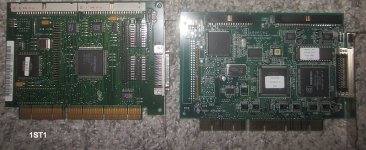1ST1
Veteran Member
Hello, I have some trouble with my Olivetti SNX140/S system regarding SCSI cards and Windows 2000 (SP4). The SNX140/S is a medium size tower PC originally designed as a small office server. So it has Pentium 166 CPU, PCI+EISA bus (3PCI+3EISA slots, one of each shared), 32 MB RAM (expandable to 256 MB), onboard AIC-7850 PCI SCSI controller (I think thats the same as a AHA-2940) and onboard Trident PCI VGA card with 512 kB RAM.
There are three PCI cards installed, a 2 channel VIA USB 2.0 card, an 100 MBit Intel chipset based network card, and a Weitek P9100 based VGA card with 4 MB VRAM, the onboard is disabled. Aditionally I have added a Soundblaster 16 Vibra PNP ISA card (in EISA slot) which is automatically detected and configured by EISA setup and Windows 2000.
To be able to connect external SCSI devices without having trouble with the internal SCSI bus (it has external connector) I grabbed from my boxes some EISA SCSI controllers and added one of them to the only free EISA slot. EISA setup is fine as long as one has the correct CFG file (and I have a large collection of CFG files). I tryed Adaptec 1740 Early revision and a later version of 1740 (they share the same CFG, but one is just displayed as a 1740, the other as a "1740 Early revision" in EISA setup), and I have tryed a AHA 2740 (single channel version). I always use the latest CFG file I have, they are from 1994. They are detected by EISA setup and configured well. As long as I select to enable their BIOS, they also appear while BIOS POST and tell that BIOS is not installed due to no drive connected (that's right). But I disable because their BIOS appears before the onboard AIC-7850 BIOS and I always want the internal harddisk to be the boot device. Enable/disable BIOS does not change anything on my problem.
The problem is that Windows 2000 does not dected any of the tryed EISA SCSI controllers (I have 3x 1740 early revision, 4x 1740, 1x 2740). There is even no unkown device in device manager, just nothing. All other cards are detected and operational.
Later on I will repeat the test with a Olivetti-customized 2740 dual channel and a Tekram DC810 EISA cache controller (AHA 1542 compatible on OS driver level) and maybe a AHA-1540 and 1542C. But I am not shur if that changes anything, but I would prefer to have one of the 1740 or the 2740 single channel in that SNX machine, the DC810 and the 2740 dual channel ist reserved fo another EISA machine (Olivetti LSX-5020)
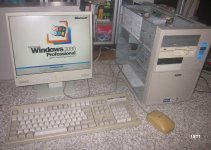
The SNX booting Win2K SP4
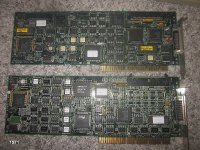
1740 (top) and 1740 Early revision (bottom)
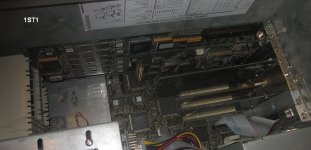
1740 installed
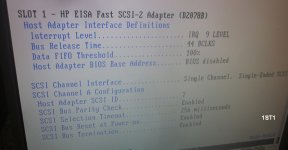
EISA setup with 1740
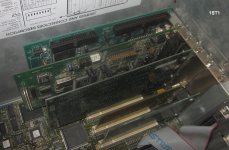
2740 installed
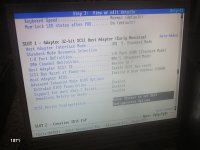
EISA setup with 2740
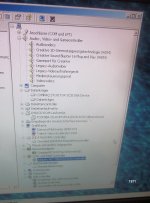
Device manager, no EISA SCSI controller detected. No difference, if 1740, 1740-early or 2740 ist installed. What I will try now is to install the latest Windows 2000 ASPI package (v. 4.71), but I don't hink it changes anything as the hostadapters even do not appear in Windows 2000 device manager.
Any idea, any sugestion to get one of them to work?
There are three PCI cards installed, a 2 channel VIA USB 2.0 card, an 100 MBit Intel chipset based network card, and a Weitek P9100 based VGA card with 4 MB VRAM, the onboard is disabled. Aditionally I have added a Soundblaster 16 Vibra PNP ISA card (in EISA slot) which is automatically detected and configured by EISA setup and Windows 2000.
To be able to connect external SCSI devices without having trouble with the internal SCSI bus (it has external connector) I grabbed from my boxes some EISA SCSI controllers and added one of them to the only free EISA slot. EISA setup is fine as long as one has the correct CFG file (and I have a large collection of CFG files). I tryed Adaptec 1740 Early revision and a later version of 1740 (they share the same CFG, but one is just displayed as a 1740, the other as a "1740 Early revision" in EISA setup), and I have tryed a AHA 2740 (single channel version). I always use the latest CFG file I have, they are from 1994. They are detected by EISA setup and configured well. As long as I select to enable their BIOS, they also appear while BIOS POST and tell that BIOS is not installed due to no drive connected (that's right). But I disable because their BIOS appears before the onboard AIC-7850 BIOS and I always want the internal harddisk to be the boot device. Enable/disable BIOS does not change anything on my problem.
The problem is that Windows 2000 does not dected any of the tryed EISA SCSI controllers (I have 3x 1740 early revision, 4x 1740, 1x 2740). There is even no unkown device in device manager, just nothing. All other cards are detected and operational.
Later on I will repeat the test with a Olivetti-customized 2740 dual channel and a Tekram DC810 EISA cache controller (AHA 1542 compatible on OS driver level) and maybe a AHA-1540 and 1542C. But I am not shur if that changes anything, but I would prefer to have one of the 1740 or the 2740 single channel in that SNX machine, the DC810 and the 2740 dual channel ist reserved fo another EISA machine (Olivetti LSX-5020)

The SNX booting Win2K SP4

1740 (top) and 1740 Early revision (bottom)

1740 installed

EISA setup with 1740

2740 installed

EISA setup with 2740

Device manager, no EISA SCSI controller detected. No difference, if 1740, 1740-early or 2740 ist installed. What I will try now is to install the latest Windows 2000 ASPI package (v. 4.71), but I don't hink it changes anything as the hostadapters even do not appear in Windows 2000 device manager.
Any idea, any sugestion to get one of them to work?

